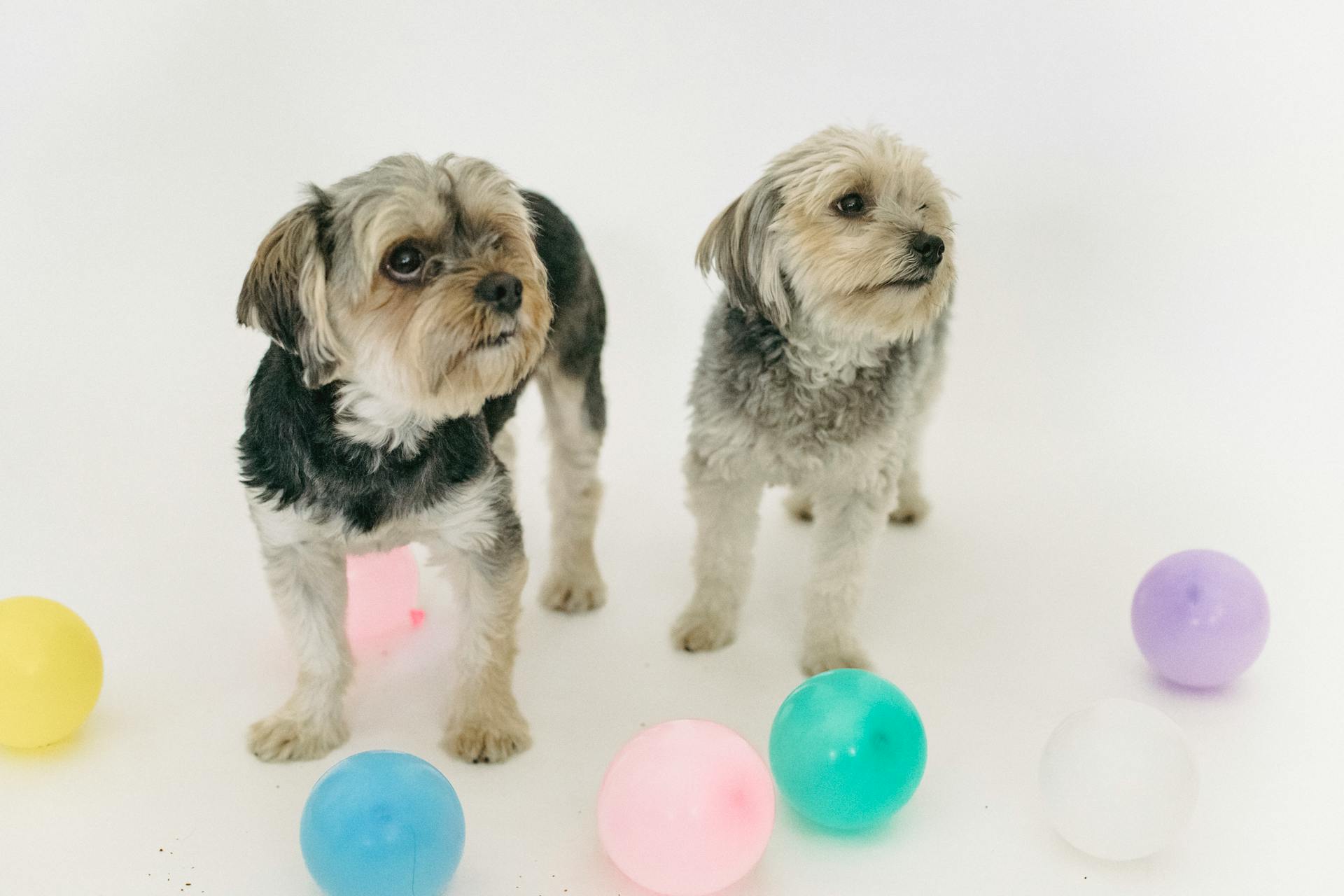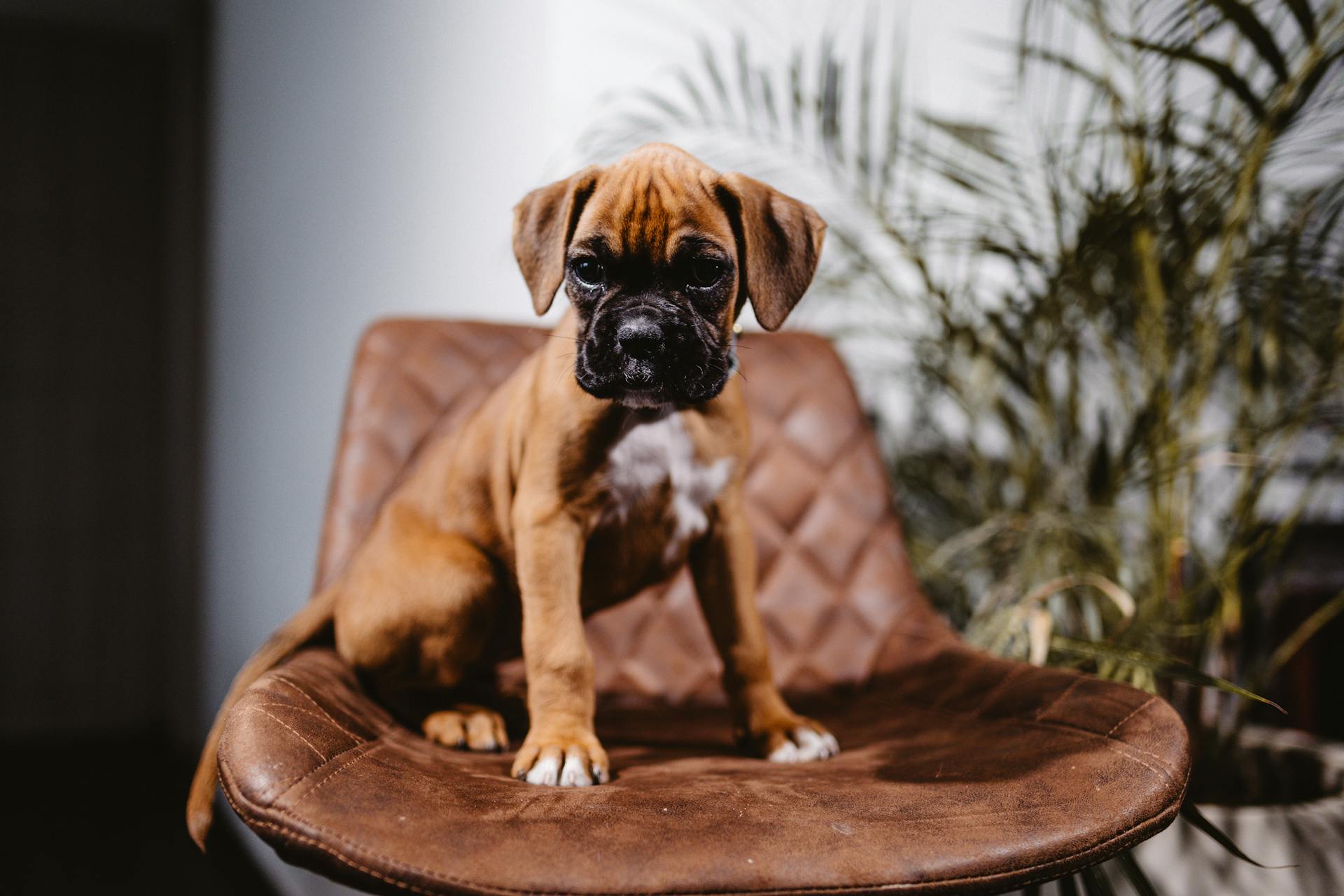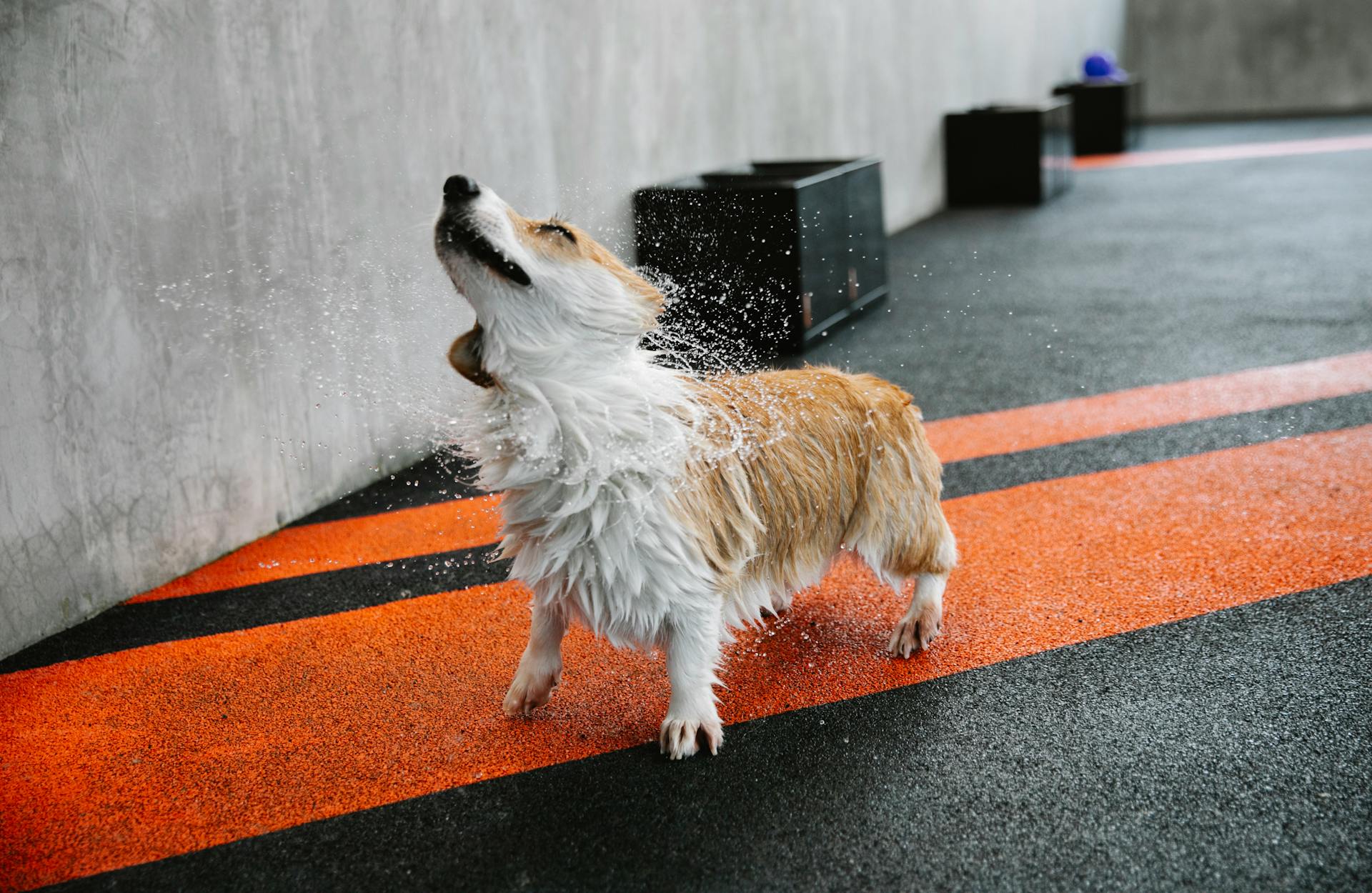
Raising a white Chorkie can be a delightful experience, but it requires attention to their specific needs.
White Chorkies are a cross between a Yorkshire Terrier and a Chihuahua, making them a small but lively companion.
They thrive in households with moderate exercise, where they can get regular walks and playtime.
Their small size means they need regular grooming to prevent matting and tangling of their fur.
White Chorkies are intelligent and trainable, but they can be stubborn at times, requiring patient and consistent training.
Their high-strung nature means they may not be suitable for very young children, but with proper socialization, they can make great family pets.
Highlights
White Chorkies are adorable, with their silky coats and tiny stature. They typically weigh around 10 pounds and stand between 6-9 inches tall.
Their lifespan is impressive, ranging from 12 to 15 years, making them a long-term companion. They are highly intelligent pooches that are quick to learn and eager to please!
Despite their small size, they have a lot of energy and require 30 minutes of exercise a day to keep them happy and healthy. They're also known to be alert and watchful, making them great watchdogs despite their small size.
Their coat type can vary, but long-haired Chorkies require regular brushing and potential professional grooming to prevent matting. They're also prone to certain health issues, such as patellar luxation, hypothyroidism, allergies, and obesity.
With proper training and exercise, White Chorkies can thrive in various living situations, from apartments to houses. They're also loyal and affectionate, forming strong bonds with families.
Health Needs
As a proud owner of a white Chorkie, it's essential to be aware of their specific health needs.
Chorkies can inherit dry, sensitive skin from their parent breeds, which may require dietary fatty acid supplementation or specially formulated shampoos.
Regular brushing is necessary to prevent matting and irritation, especially with their dense double coats.
Allergies are common in Chorkies, causing itching, hair loss, ear infections, or digestive upset if not properly managed.
To keep your Chorkie's teeth healthy, brush them daily, as small breeds are prone to dental issues.
Dental chews can also help significantly in maintaining their oral health.
Some common health issues in Chorkies include skin problems, allergies, patellar luxation, hypothyroidism, and dental issues.
Here are some specific health concerns to watch out for:
By being aware of these potential health issues, you can take proactive steps to keep your white Chorkie happy and healthy. Regular veterinary checkups and a healthy diet can go a long way in preventing these issues.
Grooming and Feeding
Grooming your white Chorkie requires attention to their coat type. Long-haired Chorkies need a good brushing at least twice a week to keep their coats free of mats and tangles.
For short-haired Chorkies, grooming is significantly less frequent. Both coat types shed very little, but the long-haired variety may require periodic trims.
Suggestion: Long Haired Chiweenie Puppy
To keep your white Chorkie's coat in top condition, brush them twice a week. This will prevent knots and tangles from forming.
When it comes to feeding your white Chorkie, choose a high-quality dog food specifically formulated for small breeds. A cup of dog food per day is a good starting point, but adjust according to their individual needs.
Here are some key considerations for your white Chorkie's diet:
- Choose a high-quality small-breed formula.
- Opt for a well-balanced combination of protein, healthy fats, and essential nutrients.
- Avoid filler foods and corn, wheat, soy, or chicken by-product meals.
Grooming
Grooming is an essential part of Chorkie care, and it's not just about making them look good - it's also about keeping them healthy and happy.
Chorkies come in a variety of coat lengths and colors, but no matter what, they require regular grooming to prevent matting and tangling.
Long-haired Chorkies need to be brushed at least twice a week to keep their coats looking their best, while short-haired Chorkies require significantly less grooming.
Their coats are often a mix of their Yorkshire Terrier and Chihuahua parents' coats and colors, which can make for some beautiful and unique patterns.
Additional reading: Long Haired Teacup Chihuahua Puppies
Chorkies tend to be hypoallergenic with a low shed coat, but if they inherit more of the Chihuahua's characteristics, they may shed a bit more.
Regular brushing will also help prevent knots and tangles, which can be painful for your Chorkie if they get too tight.
In addition to regular brushing, long-haired Chorkies may need to visit the groomers for an occasional trim and tidy-up to keep their coats looking their best.
Their grooming needs depend on their coat type, but both long-haired and short-haired Chorkies require semi-regular maintenance to stay happy and healthy.
Broaden your view: Long Haired Shih Tzu
Feeding
Feeding your Chorkie requires attention to their small size, energy levels, and potential sensitivity. A high-quality small-breed formula is essential for their overall health and well-being.
Stick to a regular feeding schedule and don't leave food out during the day to prevent overeating. Limit treats to avoid weight gain.
Chorkies need a good source of protein, and cheap "filler" dog food is not recommended. A high-quality dog food is recommended for this fancy breed.
Typically, 1 cup of dog food a day is enough for Chorkies, but choose a high-quality kibble specifically made for smaller dogs. This will give them smaller bits of kibble to chew, which is both easier and safer for them to eat.
Here are some key ingredients to look for in a Chorkie's diet:
- Essential, high-quality protein for healthy muscle development
- Calcium, phosphorus, and essential vitamins for strong bones and teeth
- Glucosamine for joint health and mobility support
- Vitamins, chelated minerals, and antioxidants for immune system health
Avoid dog food with corn, wheat, soy, or chicken (or poultry) by-product meals, as they can cause future health problems. Choose a recipe that's made in the USA by a family-owned company using quality ingredients from trusted domestic and global sources.
Training and Behavior
Training and behavior are crucial aspects of owning a white Chorkie. They are intelligent and eager to please, but can be stubborn at times.
To train your white Chorkie, use positive reinforcement methods such as treats and praise. This will help them learn quickly and prevent unwanted behavior.
Chorkies respond best to short and fun training sessions, so keep them engaging and interactive. Avoid harsh training methods like shouting or punishment, as this can cause them to shut down.
With patience and dedication, you can teach your white Chorkie to behave well and respond to commands like "come", "sit", and "stay." Mental exercise is just as important as physical exercise for their health and well-being.
Chorkies can be prone to separation anxiety, so it's essential to provide them with companionship and attention when you're away. Consider enrolling them in puppy training classes to help with socialization and curb unwanted behavior.
As a small breed, white Chorkies require moderate exercise, such as short walks and play sessions, to keep them happy and healthy. Be mindful of their small bladders and provide plenty of potty breaks.
Remember, Chorkies are loyal and loving companions, but they can be vocal and protective of their home and family. With proper training and socialization, you can help your white Chorkie become a well-behaved and loving member of your family.
Family and Home
The white Chorkie makes a wonderful addition to any family, but it's essential to consider their needs and personality traits. They thrive in any kind of home, with or without a fenced yard, and are perfect for city dwellers due to their small size.
A Chorkie is incredibly sweet, loving, and loyal, bonding strongly with their human companions. They love to snuggle up on laps and will watch your house as well as a small dog can.
For families with children, it's crucial to socialize your Chorkie at a very young age to ensure they get along well. They are good with children or other people if socialized properly, but may bark at strangers.
Here are some key characteristics to consider when deciding if a white Chorkie is right for your family:
- Low grooming requirements: Brushing once a day is sufficient, but missing a few days won't harm their coat.
- Low shedding: Chorkies hardly shed, making them a great choice for those with allergies.
- High energy: Chorkies require regular exercise and attention to prevent boredom and destructive behavior.
What's the Ideal Home?
A Chorkie can thrive in any home, but some environments are more suitable than others. They don't require a large yard, making them perfect for apartment living.
If you have a small apartment, a Chorkie will do just fine as long as they get their daily walks and exercise. However, they don't do well in the cold, so be sure to dial up the heating during winter or invest in some warm blankets and bedding to keep them cozy.
Suggestion: Are Cocker Spaniels Good for Apartments
While Chorkies can be great with children, they're best suited to homes without small, young children running around. They can get injured easily, so it's essential to have older kids who know how to play with them gently.
A single-pet household is ideal for Chorkies, as they adore attention from their humans and can get a bit jealous of other pets. However, if you do have other pets, a Chorkie can get along well with smaller dogs, cats, or other pets, but they may exhibit signs of dominance around larger dogs.
Here are some general guidelines for the ideal home for a Chorkie:
What is the Ideal Human?
The ideal human for a household is someone who can provide the necessary attention and care. They should be willing to spend around 30 minutes a day exercising their pet, whether indoors or outdoors.
This can be a great fit for families with older children, as they'll have a companion that's happy to receive lap time. Couples and single pet parents can also thrive with a Chorkie, as long as they're getting their required attention.
If long hikes aren't your thing, this breed is a great choice. They're adaptable to a variety of lifestyles and are even suitable for first-time owners.
Parent Breeds and Mix
The Chorkie's parent breeds are the Yorkie and the Chihuahua. These two breeds have a lot in common, making them a great mix.
They share similar characteristics like being energetic, playful, and territorial. Their sass is a trait that's both their greatest asset and hardest personality trait to train around.
Researching the parent breeds is key to understanding what to expect from a Chorkie. By looking into the history, personality, and size of the Yorkie and Chihuahua, you can get a better idea of what your pup will be like.
Parent Breeds
A true purebred dog will have puppies that have the same characteristics and temperament as their parents.
Designer dogs are less likely to inherit diseases than their purebred parents, and this can be a lifesaver for specific breeds.
Some designer dogs don't have to be completely purebred, as some crosses require a less even split.
Researching the two parent breeds is key to understanding a designer breed.
See what others are reading: Purebred Maltipoo
Chihuahuas and Yorkies have a lot in common, making them a good match for a designer breed.
A Chihuahua and Yorkie mix, like the Chorkie, will likely inherit traits such as being energetic, playful, and territorial.
Their sass will be their greatest asset and hardest personality trait to train around.
Both Chihuahuas and Yorkies are guard dogs that will always protect you, even if the odds are stacked against them.
For your interest: Yorkies and Chihuahuas
Chihuahua
The Chihuahua is a small dog breed that can live up to 12-18 years with proper care.
Before bringing a Chihuahua home, you need to be aware of their basic care requirements.
Chihuahuas require regular exercise, but they don't need a lot of space to run around.
You should also be prepared for the possibility that your Chihuahua may be prone to certain health issues.
Chihuahuas are known for their big eyes and small size, but they can be quite feisty and loyal companions.
To ensure your Chihuahua lives a long and healthy life, you'll need to provide regular veterinary check-ups and a balanced diet.
Frequently Asked Questions
Is Chorkie a good dog?
The Chorkie is a great companion dog, known for being intelligent, playful, and loving, making them a wonderful addition to many families. However, they do require early socialization and training to reach their full potential.
How big do Chorkie dogs get?
A full-grown Chorkie typically weighs 10 pounds and stands 6-9 inches tall.
Do chorkies bark a lot?
Chorkies may bark excessively due to their watchdog instincts, requiring training to manage their wariness of strangers. With proper training, you can help minimize their barking and create a more harmonious home
Featured Images: pexels.com


